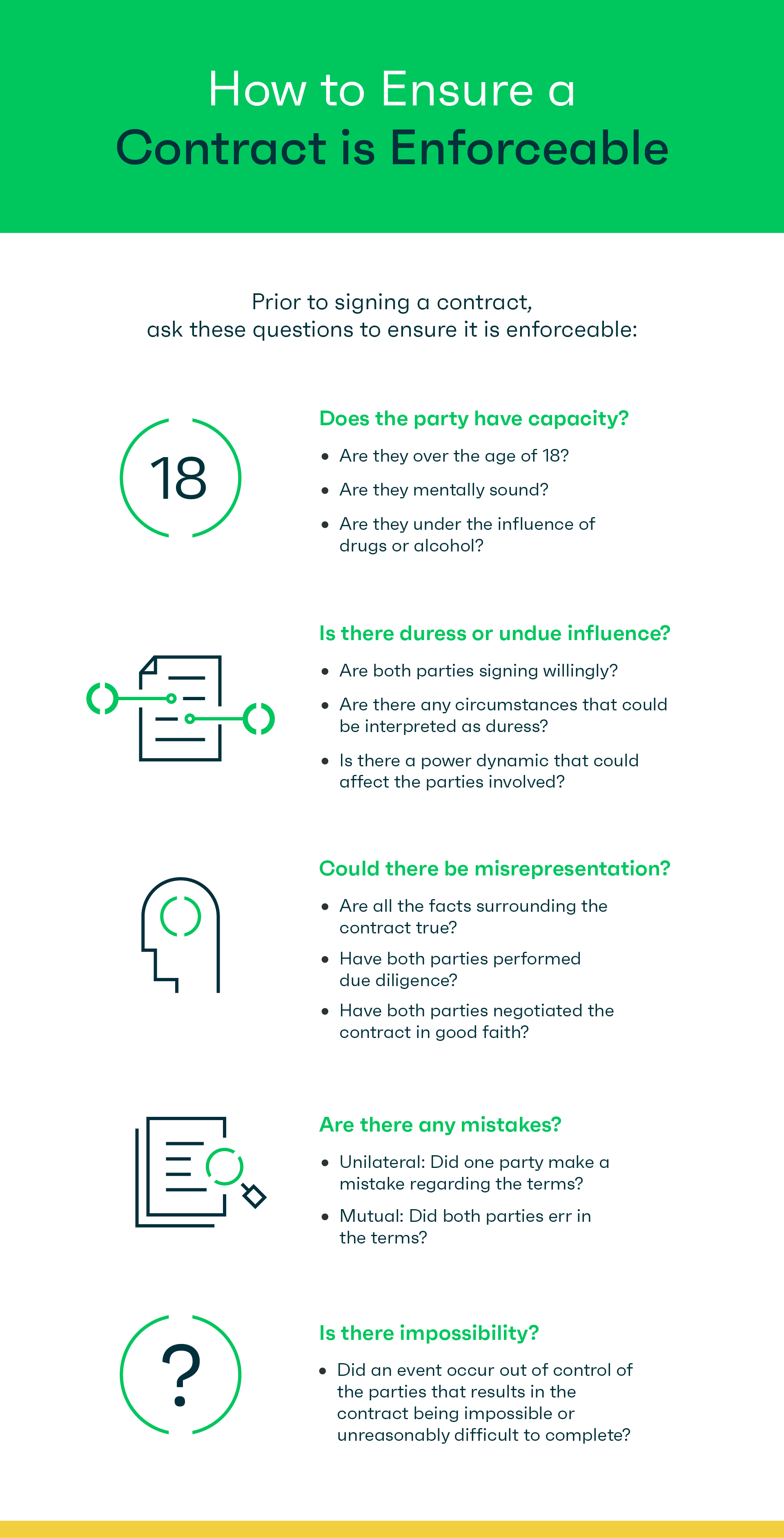Even if the law doesn’t require an agreement to be in writing, it is always a smart decision to do so. However, like everything in law, numerous exceptions can quickly turn a binding contract into an unenforceable one—meaning it cannot be enforced in a court of law. Read on to learn what makes a contract enforceable and the factors that can make it unenforceable before, during, or after signing.
The Foundation of an Enforceable Contract
To determine if a contract is unenforceable, it is important to first understand what a contract is and what makes an agreement legally enforceable. A contract is defined as a set of terms agreed upon by willing parties with capacity in exchange for something. The bargained-for exchange is known as consideration. Consideration can be anything from services to money, as long as it is adequate and fairly induces the other party to assent to the terms. If your contract falls under the Statute of Frauds, as many business contracts do, it must be in writing and signed by both parties.
The foundation of an enforceable contract is simple: offer, acceptance and consideration.
- Offer
One party proposes terms to the other. The other party may return with negotiated terms. - Acceptance
Those terms are accepted by both parties (this is called mutual assent). - Consideration
There is an exchange of reasonable value for compensation, in writing and signed by both parties.
What Makes a Contract Unenforceable?
If a contract is deemed unenforceable, the court will not compel a party to act or compensate the other for not fulfilling the contract terms. While the elements of an enforceable contract (offer, acceptance, consideration) seem simple, there are strict standards for enforceability. A contract can be rendered unenforceable for numerous reasons related to circumstances of the signing, terms of the agreement itself, or events that occur after the contract has been signed.
Potential Issues Prior to Signing of the Contract
Signing a contract can have significant consequences for both parties. It is vital to understand the circumstances that could render a contract unenforceable. By being on alert prior to the signing, you can identify any potential red flags ahead of time, which can prevent the need for costly court intervention. Here are some of the most common issues that can render a contract unenforceable.
-
Lack of Capacity
For a contract to be enforceable, both parties must have the capacity to understand the terms of the contract. What makes a contract unenforceable is when one party doesn’t understand the terms or how they will be bound by it. Lack of capacity commonly applies to minors (children under the age of 18), mentally ill individuals or people under the influence of drugs or alcohol. -
Duress or Undue Influence
Parties must agree to the terms of the contract willingly. For a contract to be enforceable, one side cannot feel threatened or pressured into signing the contract. Duress is defined as a coercive action that leaves the party with no other alternative other than to sign the agreement. In this context, a contract could be deemed unenforceable if one party threatens a lawsuit unless the other party signs. Undue influence is a bit subtler and more centered around a power dynamic. If one party is in a special relationship with the other that impacts their ability to decide to sign the contract willingly, the agreement is unenforceable. For example, contracts between employer and employee, or caregiver and patient, could be more susceptible to undue influence. It doesn’t mean they cannot have legal agreements, but special care and attention need to be paid to the circumstances regarding the contract. -
Misrepresentation
Misrepresentation occurs when one party knowingly (this is considered fraudulent) or unknowingly (this is considered negligent) makes an untrue statement with the intent to induce the other party to sign the contract.For example, Company A falsely tells a vendor they will not hire a competing business if they sign the contract. Meanwhile, Company A has a meeting with a competitor the next day and intends to enter into business with them. Company A would have committed fraudulent misrepresentation, which renders the contract unenforceable. Remember: Always include all terms of the contract in writing.

Issues Within the Contract
When looking for an example of an unenforceable contract, you will find countless agreements with issues surrounding the terms themselves. It is essential to thoroughly read and review all terms within a contract before signing. Here are some potential pitfalls that signify the contract may not be enforceable.
- Mistakes
To err is human. While it is everyone’s responsibility to thoroughly review a contract before signing, mistakes happen. But if a contract includes a unilateral or mutual mistake, a court will not enforce it. Take, for instance, parties who negotiate the sale of widgets for $5.00 per unit, but the contract includes a printing error that changed the price to $500 per widget. The contract would be declared unenforceable, and it would be changed to conform to the original intent of the parties. - Public Policy
Sometimes terms will be regarded as unenforceable because the contract could cause harm to society. Contracts that include terms opposing state or federal law are automatically unenforceable. For example, if an employer forces an employee to sign a contract that prevents him or her from taking sick leave, it would be considered unenforceable.
Events that Create Unenforceability After a Signing
Just because a contract is signed doesn’t mean both parties are held to the terms under all circumstances. Some events can make the terms of a contract impossible to complete, thus making the agreement unenforceable.
For example, let’s say Company A contracts to sell 2,000 pounds of fish for $3.00 per pound to Company B. A natural disaster causes the fish population to decline greatly. Company A has to switch suppliers, and now the fish will cost them $9.00 per pound. This loss of over $6.00 per pound would make the contract terms financially disastrous.
Conclusion
There are several important factors to consider before, during, and after the signing of a contract to safeguard its enforceability. Make sure to research and always have a contract management plan in action to ensure every agreement you make is in the best interest of your company or client.
